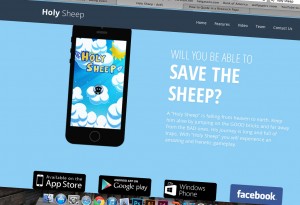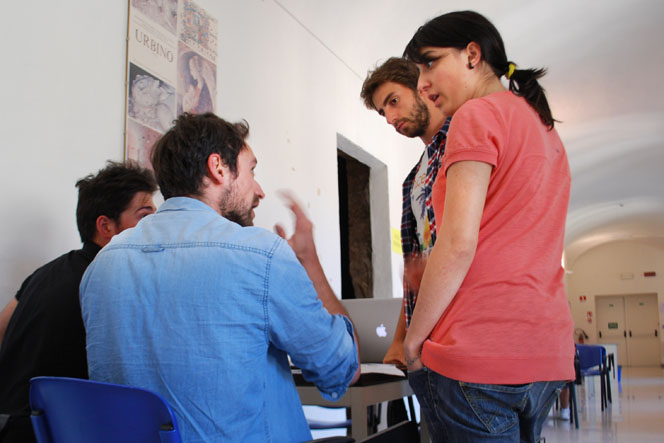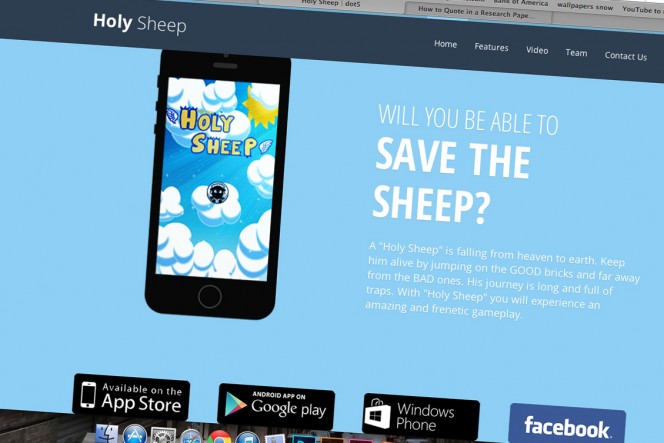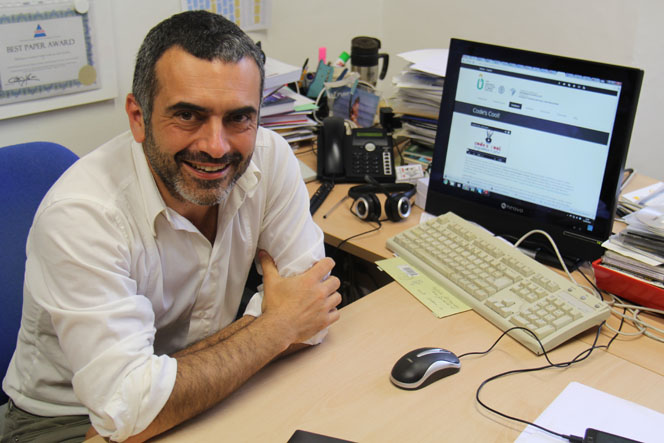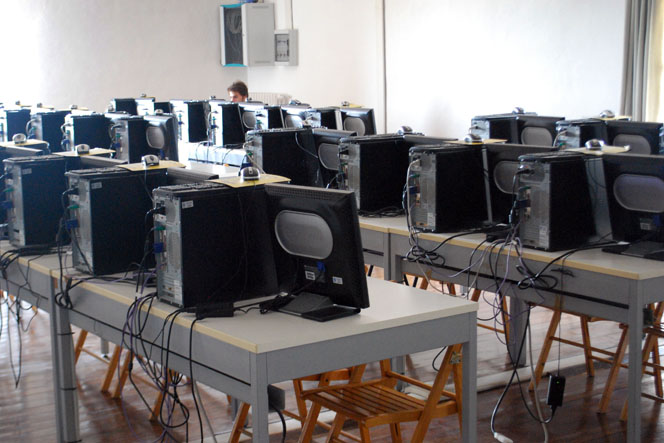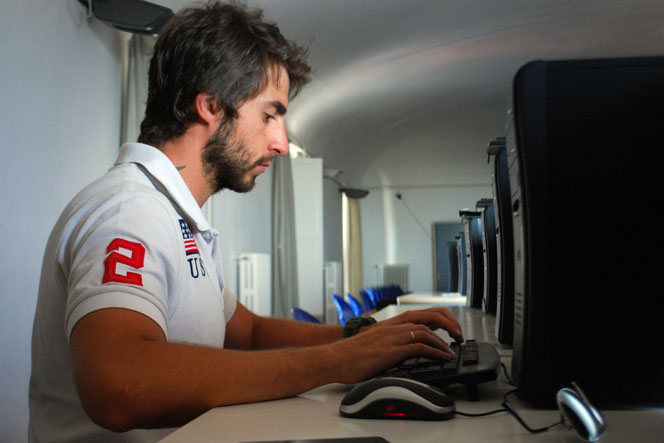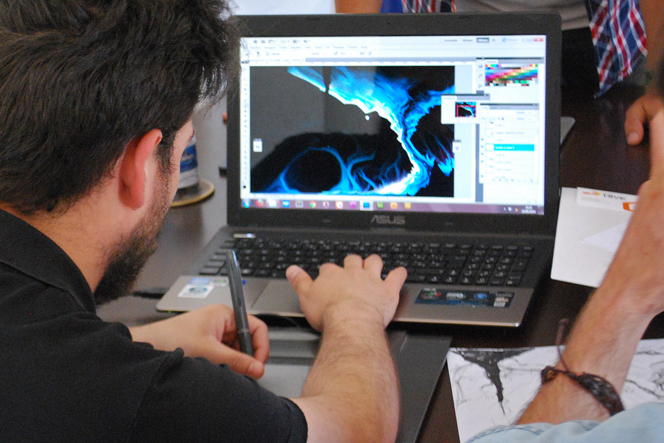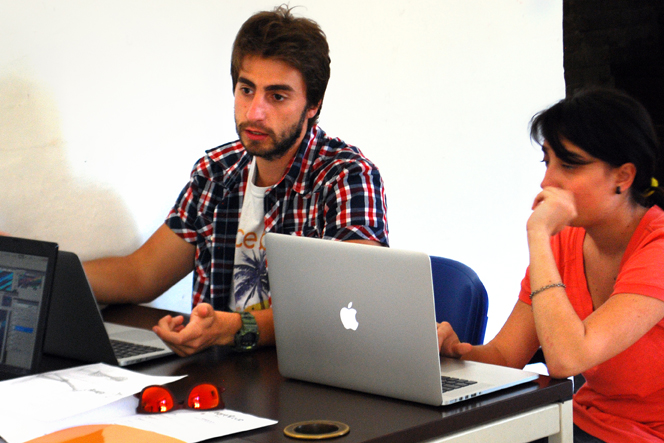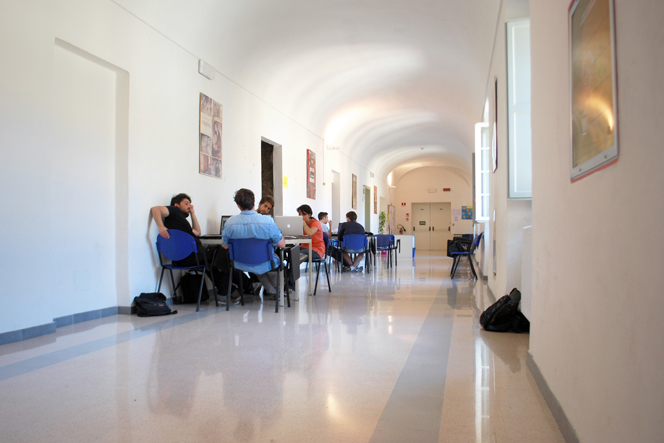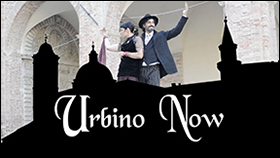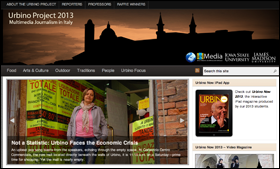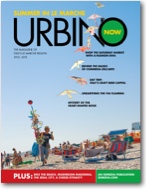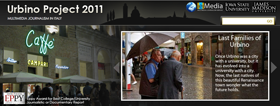Italian App Developers Face Career Challenges

After success with “Holy Sheep” Urbino students graze for new pastures
URBINO, Italy - Five University of Urbino students have taken their computer coding skills out of the classroom and into the world of mobile gaming. The objective of the game, “Holy Sheep”, is to ease the fall of a sheep from the sky, tapping left and right to hit grass patches that slow the character down. Get stuck on a patch, hit a bad brick, or fall too quickly and it’s game over. Originally the group did not anticipate releasing the game to the public, but after deciding to do so the application, or app, gained appeal.
Alessio Marzoli, Marco Mignano, Romeo Violini, Edoardo Spadoni, and Ilaria Di Meo, who call themselves Dot5, created “Holy Sheep” in 2013, and released it in April 2014. The team is now working toward a future in mobile application development and is already beginning the code and design of their next mobile game. Dot5 aspires to score high in the technology world without hitting any walls or falling to the ground like the sheep in the game.
However, the group realizes its small office in nearby Fermignano will not provide enough space and resources to allow their careers to grow. The team members are facing the challenge of deciding whether to build their existing company in Fermignano, split up to work for larger Italian businesses, or move to a more technology-friendly country where they believe the demand for app developers is greater. Dot5 team member Marco Mignano explains, “in Europe, 80 percent of [tech] companies that start in Italy move to the U.K. … it’s a must.”
This desire to go abroad arises not just from the opportunities in other countries, but also from the lack of technology startups in Italy. “Italy doesn’t have a tradition in spinoffs and startups,” says Alessandro Bogliolo, coordinator of Information Science and Technology at the University of Urbino. Bogliolo cites tight regulations and a lack of venture capitalists as reasons for the scarcity of Italian startups.
These entry barriers worry Italian students like Marco, who are seeking employment after graduation. Marco and the rest of Dot5 are considering a move to other countries like the United States or the United Kingdom to begin their careers. Marco, who visited the U.S. in August of 2012, says “I saw big difference in the mentality for games in the U.S. Here in Italy it is kind of different. We are more closed. The state doesn’t help tech companies.”
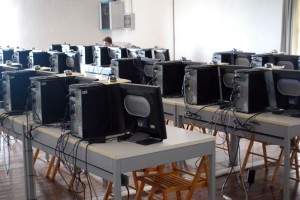
The computer lab at the University of Urbino offers a great central meeting spot for the members of Dot5.
According to a study published in the World Bank’s Doing Business Project, it costs 14.2 percent of per capita income to start a business, not just a technology startup, in Rome, Italy. Compare that to London with 0.3 percent per capita income cost, or New York City with 1.5 percent. Additionally, an annual World Bank study gives countries an index ranking based on the ease of doing business. The ranking is based on ten business regulation topics including tax rates, property registration, licensing, and employment. The study ranks Italy as 83rd in the ease of doing business, the U.K. as sixth and the U.S. as fourth.
One Spanish technology company called Fon faced the challenge of expanding its business in Italy. Fon allows people to create hotspots and share bandwidth with other users, creating a crowdsourced worldwide network of shared WiFi. After attempting to expand into Italy, Fon eventually gave up due to compliance issues with Italian regulations. Dr. Bogliolo uses this company to illustrate how difficult it is “to do something which is innovative and technology related” in Italy.
Bogliolo responds to these problems by teaching his students the skills they need to stand out in this job market. Bogliolo oversees initiatives through the School of Information Sciences and Technology that help improve the computer coding abilities of Italian students. One initiative in particular, called Code’s Cool, offers webinars that bring together students, teachers, and professionals throughout Italy to share and teach computer coding. Dot5 has appeared on a Code’s Cool webcast to explain their code and to answer questions.
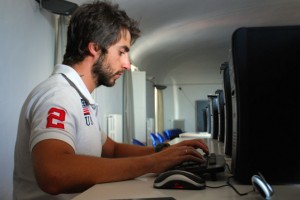
Marco Mignano hard at work in the computer lab at the university. Marco often spends long hours in the lab to perfect his coding skills and to finish his applications.
Dot5’s utilization of these opportunities is what led to the creation of “Holy Sheep”. “We do not directly teach how to develop a mobile game,” said Dr. Bogliolo. “They took advantage of all the experiences and technology that they acquired at the university while trying to push it in a different direction.”
When it comes to the decision to move to the U.K. or U.S., Dr. Bogliolo believes it is valuable to spend time abroad. However, he stresses “what is very important is to provide people with the skills to find a good job abroad, not just to migrate because there are no jobs in Italy. If you go abroad to find exactly the job you like, this is something which is an opportunity.”
While the opportunities to study abroad during school may be beneficial, Dr. Bogliolo feels students do not necessarily need to leave Italy to find a job or create a successful startup after they graduate. Bogliolo states “We are pretty satisfied with the job opportunities which are offered to our students and also the entrepreneurship they develop by themselves.” He also believes that students can become a force for innovation in a country that has fewer successful startups than the U.S. or U.K. “In countries which are less crowded with startups, you can try to make a greater difference. While in countries like the U.S., it is much harder to make a difference.” He adds: “The challenges are tough but they are worth being faced.”
One Italian startup, AppsBuilder, allows users to more effectively manage and promote their mobile applications. Since its creation in 2011 by Luigi Giglio and Daniele Pelleri of Milan, the company has received 2.5 million euro in funding from a combination of Italian venture capitals. While AppsBuilder is just one example of a successful startup in Italy, it gives hope to the members of Dot5 to continue developing apps and to work towards receiving funding from venture capitalists.
For Marco, a move to the U.S. is what he has always desired. He knows he may have some opportunity in Italy after he graduates, but he says, “USA is my dream … I saw another reality, something really different than Italy.” As for the rest of the team members of Dot5, they are uncertain what path they will take. Marco says, “My friends and I really love to make video games. We grew up with video games. This is our dream.“ It’s a dream that has yet to find a home.



